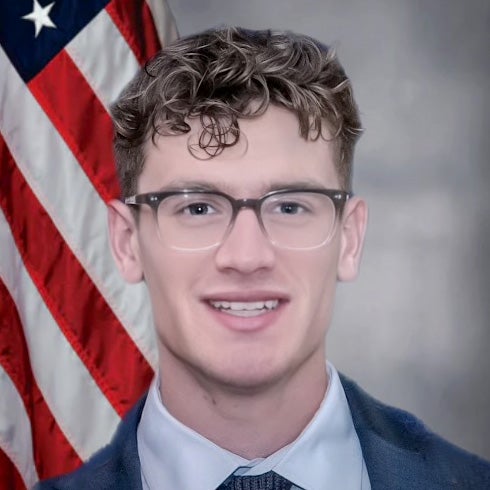Students in Accelerated Master’s Programs Sharpen Career Focus Through Coursework
(July 11, 2025) — Georgetown undergraduates majoring in human science now have the opportunity to enroll in graduate-level courses during their senior year through accelerated master’s programs at the School of Medicine.
“The human science curriculum explores human health and disease, ranging from the cellular to the population level,” said Jason Tilan, PhD, associate professor of human science and director of the accelerated master’s programs.

Jason Tilan, PhD
Students who qualify can earn their master’s degree in the fall after earning their bachelor’s degree from the School of Health. Students must be in a strong academic standing in the fall of their junior year to apply to one of the nine Biomedical Graduate Education programs, which range in focus from Biohazardous Threat Agents & Emerging Infections Diseases to Tumor Biology.
“The timeline of the programs can optimize one’s career trajectory and is a cost-effective approach,” said Tilan. “The additional benefit is the accelerated access to these graduate courses, which can deepen the scope of one’s undergraduate education.”
As the accelerated master’s programs’ first cohort completes their degrees this fall 2025, two students share their experiences about how their coursework is sharpening their career focus.
Digging Down to the Molecular

Lily deGroot (H’25, G’25)
Lily deGroot (H’25, G’25), who transferred into the School of Health from the College of Arts & Sciences, describes her human science major as the “coolest little area of campus.”
“The School of Health is really a close-knit community where people support each other, whether it’s showing up for classmates’ research presentations or working with advisors to find the perfect electives,” said deGroot.
DeGroot learned about the new accelerated master’s programs during the fall semester of her junior year. She planned to apply to medical school after graduation and take a gap year, and thought taking more courses in her major, human science, might be helpful for her future studies.
DeGroot applied for the first accelerated cohort on the Biochemistry & Molecular Biology track during the spring 2024 semester. “I really was drawn to the idea of taking more human science-related courses, especially a molecular cell biology class,” said deGroot. “The program allowed me to try and see if I liked the area of study, which was a great way to see if it’s an area I wanted to continue in.”
The required course load for the accelerated program is intense, requiring students at times to take 16 to 18 credit hours a semester. “I think most students in the human science program are super capable of being able to handle the additional courses, even at the graduate level,” said deGroot, who, during her final undergraduate semester, was also balancing research for her honors thesis.
“I’ve enjoyed the biochemistry classes for the program I’ve taken so far, and I’m currently taking a drug targets and drug design course that’s really interesting,” said deGroot. “I was hoping to find more hard sciences courses to take, and the program definitely offers that.”
DeGroot will complete her coursework this fall, including an advanced lab course as well as an internship.
“I want to become a physician, and I think having a background in molecular and cellular biology is really useful in being able to dig deep and understand the biochemical basis for disorders and disease,” said deGroot.
DeGroot encourages underclassmen to find their niche within the human science major, and she thinks the accelerated master’s program is a vehicle to do so. “The biochemistry track allows you to explore the biotechnology field from both the industry side as well as the medical side, so if you’re interested in more research or thinking through different professions after graduation, why not begin exploring those things in a master’s program your senior year?”
Chemistry and Kismet

Jackson Baker (H’25, G’25)
Jackson Baker (H’25, G’25) has always been drawn to serving others and running toward emergencies, especially while working as a special operations paramedic. He took a gap year to attend paramedic school and work in the New York City 911 system before starting at Georgetown. While completing his undergraduate studies, Baker continued to work as a paramedic in New York, Washington, D.C., and Prince George’s County, Maryland.
“I would try to stagger my work schedule so I would travel early Fridays and work Friday and Saturday nights before heading back to Washington, D.C., on Sundays,” said Baker. “I have a hard time staying still, so I enjoyed the busy weekends.”
After receiving an email about the new accelerated master’s programs, Baker was interested in exploring the Biohazardous Threat Agents and Emerging Infectious Diseases program.
“I came into the human science program wanting to go to medical school, but the more clinical exposure I had from my work as a paramedic, the more I wanted to explore something else as a career,” said Baker. “I read about the classes and people involved with the master’s program, and it sounded more like what I actually wanted to do.”
Baker described the master’s program as an interesting mix of international affairs, including defense policy, with biological sciences focused on toxic chemicals and pathogens. For example, an eye-opening course, Chemistry of War, discussed not only the chemical compositions of common agents, but also the diplomatic responses in mitigating the use of chemical weapons.
“The faculty are great — you are learning from people who work in the intelligence community or some other field that are doing the work day in and day out,” said Baker. “You can also let the courses lead you into all kinds of career fields, whether it’s into medicine as a clinician, into a lab to do research, or into government or a think tank.”
While working at an event as a paramedic, he ran into his future boss, who introduced himself and told Baker about a federal internship with the U.S. Department of Health and Human Services (HHS). Baker is hoping to transition into a full-time federal position involving response-preparedness work.
“It was a little serendipitous how everything worked out, but my program and classes helped me feel prepared for what’s next,” said Baker. “The job involves developing medical guidelines for exposure to chemical and biological agents, so I feel like I’m directly applying what I’m learning. I just feel like I landed my dream job.
“I feel very lucky to be a Georgetown human science student. … The program has such an interdisciplinary approach to studying health that offers so many paths for your next steps.”
Heather Wilpone-Welborn
GUMC Communications

